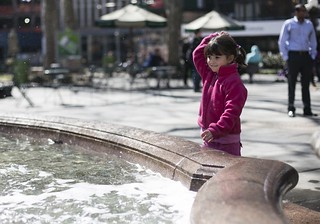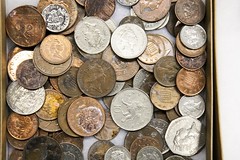
PREV ARTICLE
NEXT ARTICLE
FULL ISSUE
PREV FULL ISSUE
THE COINS OF NEW YORK'S BRYANT PARK FOUNTAINExecutive Director of the American Numismatic
Society Ute Wartenberg Kagan forwarded this story about the coins
fished from the fountain in New York's landmark Bryant Park.
Thanks. -Editor
What happens to the coins after that is another story. The fountain’s clear, bubbling waters are just blocks away from Times Square, and a favorite place for visitors and residents alike to throw coins. Nobody is counting the exact number, but they add up to roughly $3,000 to $4,000 a year. Last year, coins from 76 countries, including the United States, were tossed in. Whether they’re then picked out by scavengers (as is common in the summer) or retrieved by the park staff, they become a living, breathing part of the city. "I like throwing coins in the fountain and sometimes my wish comes true," said Soleil Skjorsammer, 7, during a recent sunny spring afternoon in the park with her mother and sister. "Before, my wish was I could be a good tennis player, and my mom told me I got better. This time, I wished I could play soccer." The Bryant Park Corporation (BPC), which manages the park, has embraced the custom that transcends many cultures. From its offices across the street, the nonprofit entity has devised an intricate system to process the piles of coins it fishes out of the fountain each month when it undergoes cleaning and maintenance. To say the least, it’s a complicated operation. But one that Jerome Barth, BPC’s vice president of business affairs, approaches with a smile. "There’s no practical way to deal with it, so we just have fun," said Barth at the BPC office last week. "I think of it as a team building exercise."
"It doesn’t smell like crisp, twenty dollar bills," said Barth. Once in a while something truly rare and unusual turns up, a curious testament to the value people place on putting something in the fountain. At the BPC office, a 50 centimes 1936 silver coin from French Indochina is estimated to be worth about $50. Another unique find was a 1955 all-silver U.K. shilling. The U.S. coins are deposited at TD Bank, because of its coin-counting machine. Though the BPC staffers admit they’ve accidentally broken the bank’s machine a few times with errant pieces of debris or dirty currency, they continue to go back. Then there are the coins they can’t spend.
Among some of the more far-flung countries represented are Albania, Azerbaijan, Kazakhstan, Cuba, Zambia, Ghana, Iceland, Brunei, Aruba, and Vietnam. More commonly occurring pieces come from the eurozone (European countries using the euro), Australia, Japan, and Canada. To read the complete article, see: If the Coins in Bryant Park’s Fountain Could Speak (www.theepochtimes.com/n3/607260-if-the-coins-in-bryant-parks-fountain-could-speak/) Wayne Homren, Editor The Numismatic Bibliomania Society is a non-profit organization promoting numismatic literature. See our web site at coinbooks.org. To submit items for publication in The E-Sylum, write to the Editor at this address: whomren@gmail.com To subscribe go to: https://my.binhost.com/lists/listinfo/esylum All Rights Reserved. NBS Home Page Contact the NBS webmaster 
|


